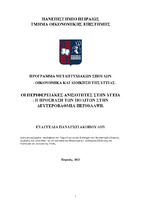Περιφερειακές ανισότητες : η πρόσβαση των πολίτων στη δευτεροβάθμια περίθαλψη
Regional inequalities in health : citizens' access to secondary care

Master Thesis
Συγγραφέας
Παναγιωτακοπούλου, Ευαγγελία
Ημερομηνία
2023Επιβλέπων
Κοτταρίδη, ΚωνσταντίναΠροβολή/
Λέξεις κλειδιά
Περιφερειακές ανισότητες ; Αποκέντρωση ; COVID-19 ; Ελλάδα ; Ισότητα ; Οικονομική κρίσηΠερίληψη
Η πρόσβαση στην υγεία είναι θεμελιώδες ανθρώπινο δικαίωμα, ενώ η υγεία είναι κοινωνικό αγαθό. Όταν οι πόροι και οι εγκαταστάσεις δεν κατανέμονται εξίσου σε μια χώρα ,το αποτέλεσμα που προκύπτει είναι ορισμένες περιοχές με υψηλή αστικοποίηση και ευημερία να έχουν μεγαλύτερη πρόσβαση, ενώ οι υποβαθμισμένες και οι αγροτικές περιοχές να έχουν περιορισμένη πρόσβαση. Αυτή η διαφορά είναι γνωστή ως ανισότητες στην πρόσβαση. Κάποιοι από τους άξονες του ΕΣΥ είναι η αποκέντρωση και η ανάπτυξη της πρωτοβάθμιας περίθαλψης. Με την αποκέντρωση να αποτελεί την μοναδική λύση όπου θα αντιμετωπιστούν τα χρόνια προβλήματα της διοίκησης που ταλαιπωρούν τον τόπο. Στην Ελλάδα με την υπάρχουσα κατάσταση ( Covid-19 καθώς και οι επιπτώσεις της οικονομικής κρίσης), το Εθνικό Σύστημα Υγείας έφτασε στα όριά του, διότι χαρακτηρίζεται από ελλείψεις σε υποδομές και υγειονομικό δυναμικό. Με αποτέλεσμα κάποιες ομάδες του πληθυσμού να αντιμετωπίζουν εμπόδια στην πρόσβαση. Οι κυριότεροι λόγοι ήταν το κόστος, λίστες αναμονής καθώς και τα μέτρα αποστασιοποίησης που πάρθηκαν λόγω covid-19 που απορρύθμισαν την λειτουργία των εξωτερικών ιατρείων και χειρουργείων. Για αυτό κρίνεται απαραίτητο το ΕΣΥ να καλύψει τις ανάγκες των πολιτών με ισότιμο τρόπο με υπηρεσίες που να προσφέρουν ποιότητα, καθώς και να επιτρέψει στις υγειονομικές περιφέρειες να είναι αυτάρκεις και αυτόνομες.
Η εργασία αυτή αποτελείται από επτά κεφάλαια. Στο πρώτο κεφάλαιο αναλύονται οι θεωρητικές προσεγγίσεις αναφορικά με την έννοια των περιφερειακών ανισοτήτων και της περιφερειακής ανάπτυξης επίσης καταγράφονται τα μοντέλα χωροθέτησης και οι προκλήσεις τους , ακόμη περιγράφονται οι έννοιες της πρόσβασης στις υπηρεσίες υγείας και το μοντέλο RAWP σε θεωρητική βάση. Το δεύτερο μέρος αφορά την οικονομική κρίση, τις επιπτώσεις της στο σύστημα υγείας, τις επιπτώσεις στην πρόσβαση στους πολίτες καθώς και τις μεταρρυθμίσεις που ψηφίστηκαν εν μέσω μνημονίων.Έπειτα, καταγράφονται τα προβλήματα της διοίκησης στα ελληνικά νοσοκομεία, τα προβλήματα της διοίκησης του ανθρώπινου δυναμικού καθώς αναλύονται τα βήματα του προγραμματισμού των ανθρώπινων πόρων.Στο τέταρτο μέρος αφορά την δομή του ΕΣΥ, σε αυτό το σημείο αναλύεται τι είναι σύστημα υγείας, η χρηματοδότηση του ΕΣΥ και τα χαρακτηριστικά του ΕΣΥ καθώς γίνεται μια σύγκριση των αριθμών της Ελλάδας σε σχέση με την ΕΕ. Ακόμη, περιγράφεται η περιφερειακή αποκέντρωση του ΕΣΥ. Στο πέμπτο μέρος θα γίνει μια αποτίμηση των υποδομών του ΕΣΥ (γιατροί, αξονικοί και μαγνητικοί τομογράφοι και νοσηλευτές). Τα στοιχεία των νοσηλευτών, ιατρών και των τομογράφων αφορούν το δημόσιο μέρος των νοσοκομείων Τα στοιχεία είναι αδημοσίευτα και έχουν παραχωρηθεί μέσω αιτήματος από την ελστατ. Το έκτο μέρος φορά την πανδημία στην Ελλάδα, την επιρροή της στην πρόσβαση και την συμβολή της τηλεϊατρικής κατά την διάρκεια της πανδημίας . Τέλος, στο έβδομο μέρος περιλαμβάνονται τα συμπεράσματα και οι πολιτικές που χρειάζεται να ακολουθήσει το ΕΣΥ ώστε οι πολίτες-ασθενείς να είναι ικανοποιημένοι και ταυτόχρονα το σύστημα υγείας να είναι αποδοτικό και αποτελεσματικό.εται μια σύγκριση των αριθμών της Ελλάδας σε σχέση με την ΕΕ. Ακόμη, περιγράφεται η περιφερειακή αποκέντρωση του ΕΣΥ. Στο πέμπτο μέρος θα γίνει μια αποτίμηση των υποδομών του ΕΣΥ (γιατροί, αξονικοί και μαγνητικοί τομογράφοι και νοσηλευτές). Τα στοιχεία των νοσηλευτών, ιατρών και των τομογράφων αφορούν το δημόσιο μέρος των νοσοκομείων Τα στοιχεία είναι αδημοσίευτα και έχουν παραχωρηθεί μέσω αιτήματος από την ελστατ. Το έκτο μέρος φορά την πανδημία στην Ελλάδα, την επιρροή της στην πρόσβαση και την συμβολή της τηλεϊατρικής κατά την διάρκεια της πανδημίας . Τέλος, στο έβδομο μέρος περιλαμβάνονται τα συμπεράσματα και οι πολιτικές που χρειάζεται να ακολουθήσει το ΕΣΥ ώστε οι πολίτες-ασθενείς να είναι ικανοποιημένοι και ταυτόχρονα το σύστημα υγείας να είναι αποδοτικό και αποτελεσματικό.


